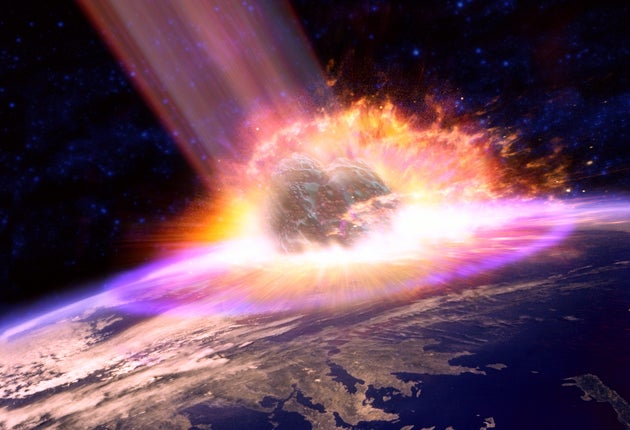Asteroid which wiped out dinosaurs 'could have sent life to Mars'
US research shows there is a ‘better than 50/50’ chance that life was seeded between bodies in the Solar System

Asteroids like the one that wiped out the dinosaurs on Earth could have shot life to Mars or the moons of Jupiter and Saturn, US scientists have said.
Researchers calculated the number of potentially life-bearing rocks that have been ejected from our planet to other bodies in the Solar System, and found the chances were “better than 50/50” that life could have made the journey.
Writing in the journal Astrobiology, the team from Penn State University said they found that there was “frequent transfer of material among the terrestrial planets” over the course of the last 3.5 billion years.
Speaking to BBC News, lead study author Rachel Worth said: “I'd be surprised if life hasn't gotten to Mars.”
Ms Worth said a small but significant number of simulated meteorite journeys made it all the way out to Europa, Jupiter’s icy moon which could have vast oceans of water hidden beneath the surface.
“Even using conservative, realistic estimates... it's still possible that organisms could be swimming around out there in the oceans of Europa,” she said.
As an example of the sort of meteorite likely to have caused rocks to catapulted from the Earth’s surface, the scientists analysed the famous impact at Chicxulub in Mexico 66 million years ago.
Then, an asteroid the size of a small city sent tremors around the world, throwing up a cloud of smoke and ash which scientists blame for wiping out the dinosaurs. That impact threw 70 billion kg of rock into space – and Ms Worth told the BBC that such large events led to “ejected debris easily finding its way from one planet to another”.
The researchers said it was beyond the scope of their study to establish whether life could have prospered on arrival – but suggested that it was entirely possible in the earlier period when Mars and Jupiter’s moons were much warmer.
Ms Worth added that what goes one way could have gone in the reverse. “It is even possible that life on Earth originated on Mars,” she said.
Subscribe to Independent Premium to bookmark this article
Want to bookmark your favourite articles and stories to read or reference later? Start your Independent Premium subscription today.

Join our commenting forum
Join thought-provoking conversations, follow other Independent readers and see their replies